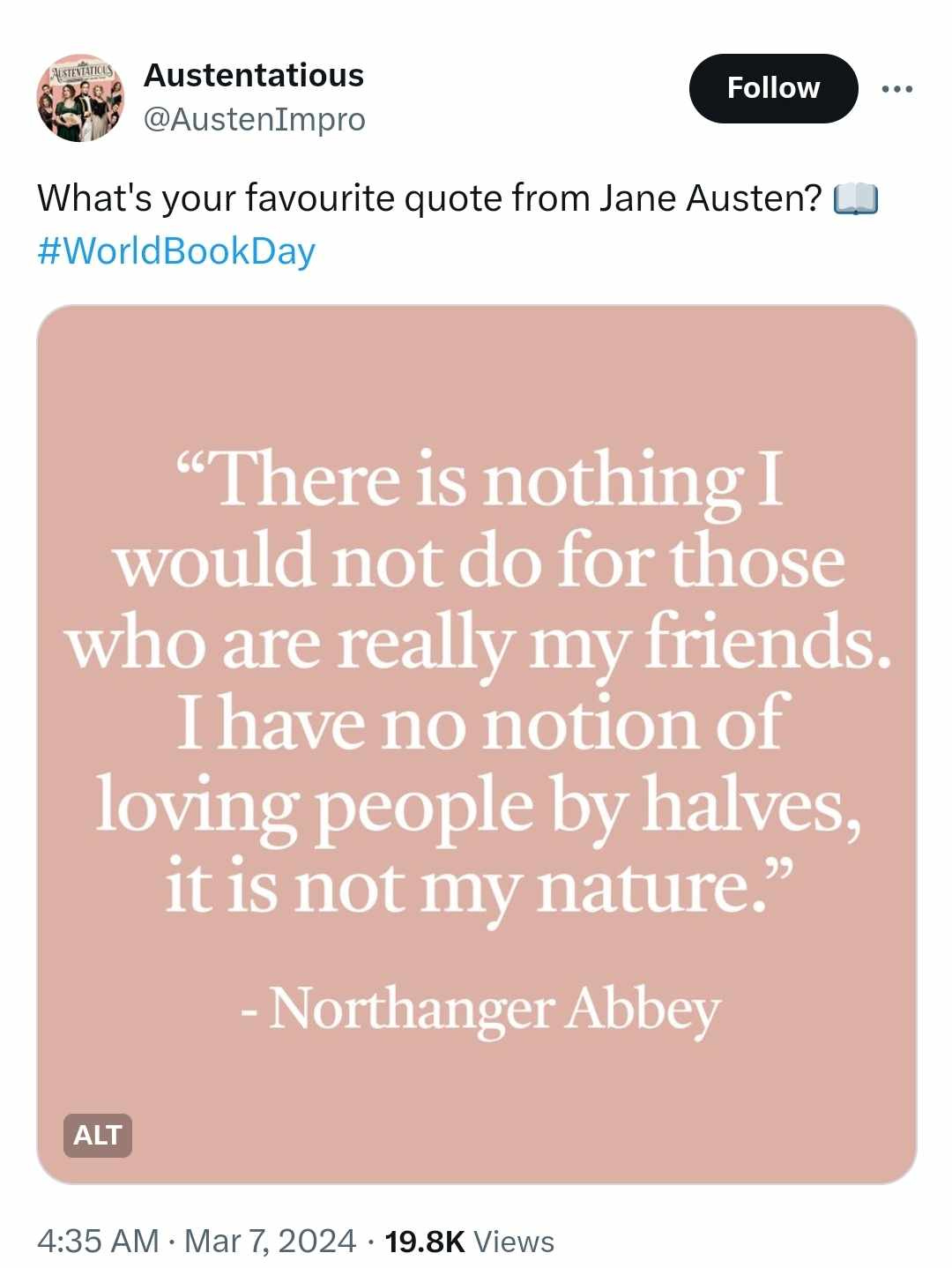Good Novels and Intolerable Stupidity
When we attribute the thoughts of a fictional character to the sentiments of their real-life author, we make a poor case for our own taste and talents in reading.
You guys have to stop quoting Caroline Bingley and Isabella Thorpe and Augusta Elton and attaching Jane Austen’s name to their insincere blatherings.
(I cannot possibly be accused of burying the lede this time.)
“There is nothing I would not do for those who are really my friends. I have no notion of loving people by halves; it is not my nature.” Thus speaks Isabella Thorpe in chapter six of Northanger Abbey, convincing the impressionable but lovable Catherine that she– the two-timing and shallow Isabella– really is a good friend. SPOILER ALERT, she is not. The words sound good, but the intent underneath is only to scheme and manipulate.
Why, then, is Isabella so frequently quoted as if her veneered little quip about her ostensible loyalty was a thoughtful aphorism Jane Austen wrote in a sermon to young ladies?
Well, the short answer is of course that media literacy is dying and people like to quote famous dead authors without actually reading them. But as Virginia Woolf once said**, “The problem with quotes taken out of context is that though technically the person quoted might have put those words to paper at some point in their life, it does not follow that the lifting of them from a fictional character’s mouth represents any part of the author’s own opinions.”
The problem with attaching this quote to Jane Austen’s name is twofold.
It implies the words are meant to be taken seriously (they’re not!) and
It implies that the sentiment reflects the opinions of Jane Austen, thoughtful and incisive author, rather than the opinions (that is, stated opinions) of Isabella Thorpe, airheaded and disloyal fictional character.
If we attributed the idea behind every line spoken by an imaginary person to the real writer who put the words together, we’d have such pithy gems as,
“You know that every traitor belongs to me as my lawful prey and that for every treachery I have a right to a kill.”
—C.S. Lewis
and,
“If they had rather die, they had better do it, and decrease the surplus population.”
—Charles Dickens
and,
“I am determined to prove a villain and hate the idle pleasures of these days.”
—William Shakespeare.
Somehow I don’t see any of these quips selling well on a coffee mug or tote bag.
No one attributes lines spoken by the White Witch of Narnia, Ebenezer Scrooge, or Richard III to their authors as if they reflected the authors’ own worldview. (Of course, we spend an awful lot more collective time carefully dissecting the works of male writers and are less likely to dismiss any of these as “chick lit” and relegate their writings to feel-good quotes on gift shop merchandise, but that’s another topic for another day…)
But when Jane Austen writes sardonically in the voice of a character whom we’re supposed to laugh at and find insufferable? Oh yeah, that’ll preach, as I think the youths say. I don’t know. I’m no longer a youth. I’m a mom reading books that are over 200 years old and getting annoyed when people cite them the wrong way.
Caroline Bingley is another of these insufferable characters, saying something she does not really mean for the purpose of impressing those around her. Well, specifically one person who is barely paying attention to her (Mr. Darcy). Caroline isn’t actually a great reader, but she maintains that she is.
Jane Austen, meanwhile, doesn’t actually tell us in so many words that Caroline is not a “great reader.” In chapter 11 of Pride and Prejudice, whence this line springs, she provides context clues that Caroline’s professed love of books is all talk and no action. Caroline has previously spoken of books in terms of their purchase and how elegant they appear in the library at Pemberley, but mentions none of her favorite titles; now she takes up the second volume of what Mr. Darcy is reading, a choice that cannot be particularly entertaining for someone who, we must infer, has not read the first volume herself; and she is so busy trying to get Mr. Darcy’s attention by inquiring after his reading progress that she finally gives up her own attempt to read altogether, and then declaims a bunch of hogwash about how much she loves to read.
Jane was laughing in her sleeve at Caroline, and you are supposed to do the same. Not by emblazoning her words upon the face of Merch and earnestly claiming them as your own sentiment, but by understanding that Caroline Bingley is a figure of satire and that the study of her character is intended to make you examine your own.
Perhaps, then, we ought to follow the example of Michael Scott in The Office.

It would look something like this:
“There is nothing like staying at home for real comfort. Nobody can be more devoted to home than I am.”
—Mrs. Elton (ugh)
—Emma, volume two, chapter 14 (which contains context describing Mrs. Elton’s various barbarisms and general insincerity and mindless prattle)
—Jane Austen (someone who ironically did indeed spend a lot of time at home and was quite devoted to domestic felicity at Chawton Cottage)
All right, all right, perhaps that’s a bit much but at the very least I am begging people to cite the character they are quoting when a line of fiction is presented as an inspirational motivational poster child. Please?
Let us have context, at least. And let us do the authors we claim to admire the honor of reading said context for ourselves, and neither googling “good quotes from Jane Austen that will make me look smart on the internet” nor baldly attributing fictional thoughts from a fictional mind to the very real genius and psyche of a very real person.
Unless those thoughts are from Henry Tilney. In that case, I do believe Miss Austen’s own sentiments were probably pretty well reflected in his witty repartee.
“The person, be it gentleman or lady, who has not pleasure in a good novel, must be intolerably stupid.”
—Henry Tilney, chapter 14 of Northanger Abbey
**no she did not. Don’t be so gullible.
This post is a part of The Summer of Jane Austen, a literary-inspired endeavor that will (I hope) fuel both a journey of the mind and my own journey to the Jane Austen Society of North America’s Annual General Meeting. More here.





I love this so so so much. Jane Austen was SO sarcastic, it is painful to see her taken so seriously - misunderstood and misrepresented.
This is fantastic.
Also, people could take some pointers in how to read the Bible from this post, even if you believe the characters to be actual people. It's a bit galling, for example, when people quote Job's friends as a theological truth. I think we'd all be better people generally if we knew how to properly read.